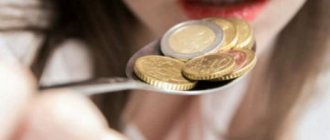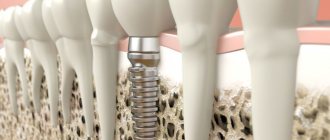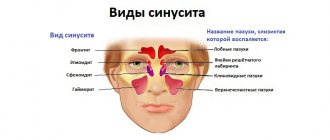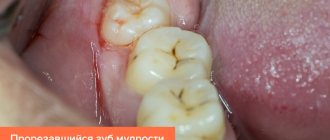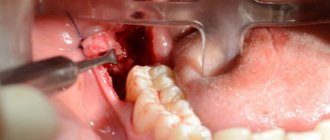Why does a bitter taste appear in the mouth after eating?
Bitterness in the mouth that occurs in the morning may be a consequence of age-related changes in taste buds or a symptom of a disease of the gastrointestinal tract.
What to do if you have a bitter taste in your mouth is the topic of today’s review. From the article you will learn about the main causes and treatment of this manifestation. Causes of bitterness:
- inflammatory diseases of the biliary tract (bitterness occurs in the morning);
- liver diseases (pain in the right side (hypochondrium) and bitterness appear after physical activity);
- stomach diseases (bitterness occurs after eating);
- parasitic infestations;
- pregnancy;
- diseases of the oral cavity;
- taking medications;
- endocrine diseases.
1.General information
Modern medicine knows a monstrous, incalculable number of clearly defined and described symptoms, i.e. objective signs of a particular disease. At the same time, with the accumulation of statistical data and research results, as well as with the development of the theoretical paradigm, the number of symptoms classified as pathognomonic (this term implies an unambiguous sign that is always observed in a given disease and is not found in any other diseases) is rapidly and steadily decreasing. The tendency to blur the informativeness of diagnostic signs is to some extent promoted by both pathomorphosis (changes in the typical clinical picture of diseases over the years and decades), and the tendency of modern man to self-medicate, which often “blurs” or distorts the symptoms.
There are almost universal symptoms that accompany most known diseases - for example, headache or “general malaise”, i.e. decrease in subjective well-being. Based on these complaints alone, it is impossible not only to make an accurate diagnosis, but even to suggest the field to which it will relate (neurology, endocrinology, virology, and many others). Other symptoms seem to more clearly indicate the most likely source of the problem, but upon closer examination it turns out that not everything is so simple here either. Such “understandable” but sometimes very misleading symptoms include, in particular, bitterness in the mouth.
A must read! Help with treatment and hospitalization!
Diseases that cause bitterness
Disorders of the biliary tract and liver function. Bitterness in this case, as a rule, appears in the morning. Symptoms of diseases of the gallbladder and liver are a metallic taste in the mouth, darkish color of urine, yellowness of the skin, white coating on the tongue.
Gastrointestinal diseases. Patients often ask: “could bitterness in the mouth be a symptom of stomach disease?” Undoubtedly. There are several diseases whose characteristic manifestations are bitterness. Gastric dyspepsia, gastroesophageal reflux disease, gastritis and ulcers. Additional symptoms in this case will be heartburn, a feeling of heaviness in the stomach, flatulence and nausea.
Oral diseases. Most often we are talking about dental problems. Inflammation of the mucous membrane and soft tissues can cause changes in taste.
Medications. When taking antibacterial, antihypertensive, antidiabetic and hormonal drugs, a bitter taste may occur in the mouth. Read on to learn how to remove bitterness in your mouth after taking antibiotics.
Pregnancy. The cause of bitterness is hormonal changes in the body.
Endocrine diseases. If the thyroid gland and adrenal glands malfunction, a hormonal imbalance may occur, causing spasm of the bile ducts.
2. Reasons
Even a non-specialist in the vast majority of cases associates a bitter taste in the mouth with a pathological state of the digestive system, more precisely, the liver and/or biliary tract. Indeed, the biochemical and physiological evolution of higher mammals has led to a strange paradox. As you know, bile produced by the liver is absolutely necessary for the digestion of food, be it the simplest food or exquisite delicacies. But at the same time, bile itself has a sharp unpleasant odor and an unbearably bitter taste, so normally it goes directly into the intestines (starting from the duodenum) and does not come into contact with the taste buds of the oral cavity. However, in a number of abnormal or clearly pathological conditions and processes, bile stagnates, is thrown into the stomach and esophagus, its taste is felt in the mouth - in a word, that same bitterness appears. In some cases, this may be associated with the consumption of too fatty foods or simply with banal overeating (the bitterness disappears as the body copes with the overload), in others it serves as one of the diagnostically significant signs of a serious gastroenterological disease. Thus, the most likely groups of causes of bitterness in the mouth are:
- diseases and any congestion in the biliary (bile) system, i.e. all kinds of dyskinesias, anomalies or pathologies of the bile ducts, cholelithiasis, pathology of the gallbladder, etc.;
- liver diseases: hepatitis, oncopathology, cirrhosis, etc.;
- diseases of the gastrointestinal tract with reflux syndrome (reflux into the esophagus): gastritis, gastroduodenitis, cancer of the pancreas and other gastrointestinal organs.
However, the above reasons, with all their diversity and, indeed, the greatest probability, do not exhaust the list of possible sources of bitterness in the mouth. You should also add to it:
- allergic reactions (in particular to dental materials);
- chemical intoxication, incl. taking certain groups of medications with hepatotropic side effects;
- inflammatory processes (especially with a purulent component) in the oral cavity;
- the presence of worms;
- endocrine disorders;
- infections;
- dysbacteriosis;
- hormonal changes associated with gestation (pregnancy) or menopause;
- deficiency or imbalance of a number of microelements necessary for the body (B vitamins, zinc, etc.);
- smoking (the more cigarettes smoked per day, the more stable and intense the bitter taste in the mouth and lips), as well as withdrawal symptoms when quitting smoking, which can be controlled with a special diet and vitamin therapy;
- alcohol consumption;
- abnormal mental states (depression, chronic stress, etc.).
Visit our Gastroenterology page
Bitterness in the mouth: symptoms
Bitterness in the mouth, the cause of which is a disease of the internal organs, is not an isolated symptom. Depending on the pathology, it may be accompanied by dry mouth, white coating on the tongue, belching, nausea and vomiting.
Plaque on the tongue due to internal pathology:
- a gray-white coating, bitterness in the mouth in the morning and an unpleasant odor indicate dyspeptic disorders, ulcers or gastritis;
- thick white coating with a wound surface - fungal infection or thrush;
- white with spots or slightly yellowish coating – a sign of gastritis;
- brown coating at the base of the tongue – intestinal intoxication, iron deficiency or “smoker’s syndrome”;
- white plaque with red spots (“geographical” tongue) – chronic diseases of internal organs.
The treatment of bitterness in the mouth will be discussed further. Medication, traditional medicine recipes or complex therapy – which is better?
On our website you will find more detailed information. Our doctors will answer all questions, for example, how to get rid of constant bitterness in the mouth after gallbladder removal. You can make an appointment using the above numbers.
Treatment
Treatment should be comprehensive and include measures to normalize lifestyle, diet and diet, as well as drug therapy. If possible, eliminate physical and emotional stress that negatively affects the motility of the gastrointestinal tract. Long breaks in meals, consumption of fatty, extractive foods, marinades, smoked meats, and coffee are unacceptable. Avoid smoking, drinking alcohol and carbonated drinks. Drug therapy is selected by a gastroenterologist depending on the severity of symptoms and examination results.
Duodenogastric reflux, or the reflux of duodenal contents back into the stomach, is an extremely common digestive disorder. The symptoms that indicate this pathology are subjectively interpreted by many as “heartburn” or “indigestion,” which indicates their low specificity. An accurate diagnosis can only be made by a specialist after a thorough examination. If you experience discomfort associated with eating, we recommend that you contact Professor Gorbakov’s Clinic for specialized help.
Normally, food enters the oral cavity, moves down the esophagus into the stomach, and then enters the duodenum. Here it mixes with bile, which ensures the emulsification (breakdown) of fats and the absorption of most of the nutrients. The unilateral evacuation of food into the duodenum is supported by the reflexive opening and closing of the pyloric sphincter (pylorus). It also prevents retrograde (backward) flow of the bolus.
Improper functioning of the sphincter (its insufficient locking), as well as hypertension in the duodenum associated with chronic duodenitis, can cause bile to flow back into the stomach - duodenogastric reflux.
Often this disorder provokes the presence of inflammatory processes in the stomach (gastritis), duodenum (duodenitis), gallbladder (cholecystitis, biliary dyskinesia), pancreas (pancreatitis), and surgical interventions, namely:
- cholecystectomy;
- gastric resection;
- vagotomy;
- gastroenterostomy;
- enterostomy.
Diagnosis and treatment of bitterness in the mouth
If the bitterness in the mouth is constant, consultation with a specialist is necessary. In this case we are talking about a gastroenterologist. Since the treatment is mainly complex, consultation with other doctors may be required, namely a gynecologist, endocrinologist or psychotherapist.
After examining the patient and collecting anamnesis, the doctor may prescribe additional laboratory and instrumental research methods, which include:
- General analysis and blood biochemistry;
- blood test for hormones;
- general urine analysis;
- ultrasound examination of the gastrointestinal tract;
- X-ray and FGSD.
Based on the examination results, the specialist will prescribe treatment for bitterness in the mouth. The course of therapy is strictly individual, taking into account the patient’s condition and the course of the disease.
Gallbladder and liver problems
If bitterness causes you anxiety every day for a long time, it's time to get your liver and gallbladder checked. Perhaps, as a result of a malfunction or inflammation, the gallbladder does not have time to remove bile from the body on time, and it ends up in the esophagus. This is where the unpleasant taste comes from.
What to do
- A blood test is mandatory; it is advisable to do both a general and biochemical one, as well as an ultrasound of the abdominal organs.
- As a rule, the doctor recommends taking anti-inflammatory and choleretic drugs (prescription only).
- For patients with cholelithiasis and cholecystitis, a diet is prescribed: milk and light vegetable soups, low-fat cottage cheese and kefir, boiled fish, marmalade, and tea are allowed.
- It is recommended to drink about 2-3 liters of liquid per day
- Decoctions and infusions of chamomile and calendula are useful, for the preparation of which 1 tsp is used. dried inflorescences are brewed with a glass of boiling water for 15-20 minutes. Take the decoction 3 times a day, 1 tbsp. l. half an hour before meals.
Drug therapy for bitterness
Treatment depends on the pathology causing this manifestation. If we are talking about gastrointestinal diseases, then it is appropriate to prescribe medications aimed at restoring digestive function (almagel, vikalin, de-nol, motoricum). In case of disturbances in the outflow of bile, choleretic drugs and decoctions of choleretic herbs are indicated. Treatment of bitterness in the mouth in the morning caused by stress includes the prescription of sedatives based on hawthorn, valerian, motherwort, etc. Consultations with a psychotherapist are an excellent addition to taking sedatives. It is best to ask your doctor about how to treat severe bitterness in the mouth during pregnancy.
Bile in the stomach (duodenogastric reflux)
Duodenogastric reflux is the reflux of the contents of the duodenum into the stomach cavity. Normally, after a certain period of time after food enters the stomach, a portion of bile is released into the lumen of the duodenum, aimed at further, more thorough digestion of the food bolus. The presence of bile creates an alkaline environment in the cavity of the duodenum. At the border of the stomach and duodenum there is a pyloric sphincter, which prevents the movement of food in the opposite direction and separates the acidic environment of the stomach from the alkaline environment of the duodenum. If the function of the sphincter is impaired, for example, if it is not fully closed, the alkaline contents of the duodenum enter the stomach. Burning has an irritating effect on the gastric mucosa, which, when exposed to it regularly, causes a chronic inflammatory process called reflux gastritis.
Treatment of bitterness with folk remedies
Herbal medicine is appropriate in complex treatment under the supervision of a specialist. Chamomile infusion, flax seed jelly, and corn silk decoction will help get rid of such an unpleasant symptom. Therapy with freshly squeezed juices has proven itself well. For this purpose, potato is used, which activates the intestines and eliminates heartburn, carrot, beetroot, which is effective for diseases of the biliary tract, and cucumber. Juices have a general strengthening effect, help cleanse the organs of toxins and normalize digestion processes.
Treatment of bitterness in the mouth in the morning: preventive measures
If bitterness in the mouth is episodic, you should pay attention first of all to your diet. It is necessary to limit the consumption of fatty and smoked foods, coffee, strong tea, processed foods and sweets. Focus on cereals, fresh vegetables and dairy products. You should eat small meals, but often. Normalize your drinking regime. Stop smoking and alcohol. If the cause of bitterness is stressful situations, make an appointment with a psychotherapist. Our doctors will also help solve the problem. If you are concerned about the question “why does a bitter taste appear in your mouth after eating,” make an appointment right now.
Related services: Family doctor consultation Videogastroduodenoscopy
Why is the tincture bitter? How to remove bitterness from tincture
It often happens that when preparing homemade tincture recipes, bitterness appears in the final drink. The reasons for this effect may be different. For some drinks this is normal (for example, in the case of tincture of galangal, rowan, cranberry, anise and some other herbs and berries). Almost always, bitterness accompanies tinctures on nut shells, especially if the infusion period was long. However, the appearance of a bitter taste is not always due to the specifics of the raw material. Let's look at the main reasons and methods for getting rid of excessive bitterness.
Why is the tincture bitter?
There may be several reasons for this:
- features of the nature of the ingredients (herbs, nuts and their shells, rich in bitter and tannin substances);
- low quality ingredients (long-stored or old herbs, nuts, dried berries);
- long infusion period (the longer, the more substances pass into alcohol. For example, from berry seeds).
Sometimes the tincture becomes bitter if the quality of the alcohol base is poor (for example, if low-quality moonshine was used). To avoid the influence of this reason, it is best to use a pure, high-quality product obtained using modern equipment (we recommend paying attention to the Luxstahl 8m moonshine still).
How to remove bitterness from tincture
If the result is too much bitterness or there shouldn’t have been any in the drink, you can use the following methods:
- use of special activated carbon brands BAU, KAU. These brands are specialized for the alcoholic beverage industry and help purify alcohol from impurities. However, remember that they will take on not only bitterness, but also other aromatic components. Therefore, the taste of the tincture as a whole will be a little poorer;
- adding juice/tonic. The result is a cocktail version, and do this immediately before consumption. In general, there are several recommendations on how to drink bitters. For example, tomato and citrus juices, as well as some types of other alcohol, go well with bitter and spicy liqueurs;
- softening bitterness with honey or glucose syrup. The sweetness will smooth out the harsh notes, but the main thing in this matter is not to overdo it.
How to remove bitterness from rowan tincture
Rowan itself is bitter, especially if it was collected before the first frost. If you overdosed the drink or added too many berries, you can try to soften the taste with honey, glucose solution or food glycerin. However, it is honey that will fit in as organically as possible. Start with minimal amounts of sweetener in a test volume of the tincture, and only after choosing the desired proportion, add honey to the main volume of the drink.
How to remove bitterness from alcohol tinctures
Any of the methods described above. Sometimes the bitterness is enhanced by the hardness of the alcohol (especially if it is of mediocre quality). In this case, softening will also help (you can use food grade glycerin), but cleaning with charcoal will not help, since a slight release of aldehyde during such cleaning will make the alcohol even more “vigorous”.
